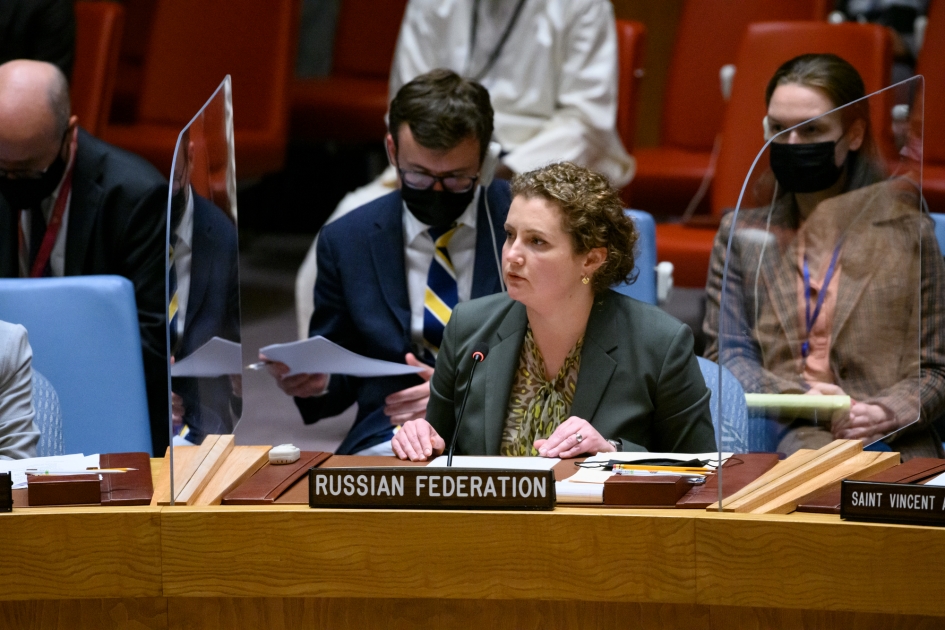Statement by Deputy Permanent Representative Anna Evstigneeva at UNSC briefing on the situation in Ethiopia
Mr.President,
We thank Secretary-General Guterres for briefing us on the developments in Ethiopia. We welcome Permanent Representative of Ethiopia Ambassador Taye Selassie to this meeting.
At the outset, let me congratulate all Ethiopians on the formation of a new government on 4 October. The electoral process is complete; it demonstrated that Ethiopian political forces were ready for an internal dialogue aimed at resolving the problems that the entire population of the country is faced with – in the interests of development, peace and prosperity. The Russian Federation will continue supporting the territorial integrity, sovereignty and independence of friendly Ethiopia.
We keep following the military and political developments in the north of the country. We believe the “Tigray file” to be an internal affair of Ethiopia, and we are convinced that its national potential for reconciliation has not been depleted. We proceed from an understanding that Addis Ababa can resolve the existing problems on its own, given support of the international community, first of all regional states. We support solution-seeking efforts of the new High Representative of the African Union for the Horn of Africa, Mr. Olusegun Obasanjo. We know that he already assumed his duties and established first contacts in the Ethiopian capital. We look forward to this work yielding concrete results.
Yet we believe that purposeful escalation of international rhetoric with regard to the situation in Ethiopia’s north and overwhelming politicization of its “humanitarian file” hinders the attempts of the African Union to produce mediator efforts. Taking into account the depth of controversy and the complex historical context, we cannot expect this process to be quick. That is why only synchronization of efforts and painstaking diplomatic work, i.a. via bilateral channels, can bring results. We are convinced that pressure involving the Security Council, threats regarding adoption of resolutions, usage of illegal unilateral sanctions, and creating toxic vibes in Media are counterproductive.
Mr.President,
As for the humanitarian situation in the north of Ethiopia, we fully share concerns regarding the growing humanitarian needs of this area. The region used to be food insecure before the crisis, now finds itself in a very precarious situation. Continuing violence in Tigray and the neighboring Afar and Amhara escalates the overall situation and triggers further movement of IDPs and refugees.
There are concrete problems that require immediate response and that we believe need to be addressed urgently. In the first place, we mean the situation with WFP trucks that got “stuck” in Tigray. It is unacceptable to block passage of UN humanitarian transport, all the more so – to use it for alternative purposes.
We have repeatedly stressed both in the Security Council and at other platforms, that if media focuses solely on the humanitarian situation in Tigray, it will politicize this issue and draw dividing lines in the Ethiopian community. Neither hardships of the population of Afar and Amhara that are affected by the conflict to the same extent as the people of Tigray, nor problems of other Ethiopian regions must be diminished.
Mr.President,
Russia unfailingly supports humanitarian efforts of the United Nations, and pays tribute to humanitarian and medical workers who are deployed in difficult and often dangerous conditions, providing urgent humanitarian assistance to people who need it in remotest parts of the globe, including Ethiopia. We make annual financial contributions to the work of a number of programs and funds. We intend to set forth this assistance, remaining fully reliant on the expertise of the “humanitarian wing” of the United Nations.
We regret the decision made in Addis Ababa last week to expel UN personnel from the country. Surely, it will not add to resolving Ethiopia’s acute humanitarian crisis.
At the same time, we call to not overdramatize the developments. Once engaged in a mutually respectful dialogue, Addis Ababa and the UN Secretariat will be able to recover trust and resolve the outstanding disputes amicably and in the interests of the aid-needing population. There are many questions to this issue, especially what regards steps that have or have not been made to prevent negative dynamic. It is important to put things into perspective and draw conclusions so that such incidents never occurred again.
With regard to this and other situations that occur throughout the globe, we are convinced that humanitarian assistance must be discharged in full compliance with UNGA resolution 46/182, the UN guiding principles, international law and national legislation.
We have to say once again that it is imperative to establish a trustful and constructive dialogue and close cooperation with sovereign Ethiopian authorities that still cover the "lion’s share” of all humanitarian needs of Tigray and the neighboring regions.
In conclusion, we reiterate Russia’s readiness to keep promoting stabilization in Ethiopia and larger Horn of Africa region.
Thank you.
